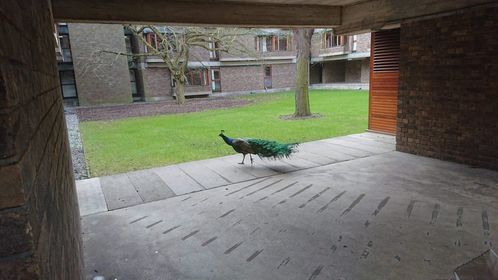
When you arrive at Cambridge, there are a lot of things that you are told are important, such as rowing, acquiring a college spouse and, on occasion, passing your exams.
In my opinion, these are all wrong. Through my years at Cambridge, I have learnt that the most important and indeed most exclusive thing in Cambridge, other than a Wednesday Cindies ticket, is right under your feet – grass.
In many colleges, grass is the exclusive privilege of fellows. The highest privilege in Cambridge is not a First, or a Blue, or a leading role at the ADC, it is being allowed to put one foot after the other on some green turf without the threat of punishment.
The highest privilege in Cambridge is not a First, or a Blue, or a leading role at the ADC, it is being allowed to put one foot after the other on some green turf without the threat of punishment.
Amy Walpole
Churchill is a wonderful exception to this odd rule. Though from the front, it might seem the ultimate brutalist urban concrete dream, hiding behind it are beautiful stretches of greenery. Churchill has the largest college site in Cambridge, at 42-acres, and you can walk on all of it, apart from the Fellows’ Garden.
When I was forced to evacuate my room in Lent Term, I was upset that I would not get to see Churchill in summer – something I had been looking forward to all year. In summer, I could make the most of all the green space: having dinner outside, exercising in the open air without threat of frostbite, or laying on the grass trying to get my head around impossible ancient philosophy.
Green space does not only look nice – it is also good for you. Many studies have shown that interactions with nature improve mood, attention, and can reduce stress and anxiety. When you are in nature, your blood pressure lowers, cortisol level drops, and pulse rate decreases. Even the mere act of looking at a natural landscape can speed up recovery from stress, mental fatigue or illness. Listening to the sounds of nature does the trick too.
It does not take a 3-hour hike to reap these kinds of benefits – even spending 5 minutes in nature can make a significant difference.
It is often mild distraction that moves the imagination forward, not uninterrupted concentration.
Author Rebecca Solnit
Nature can also provide some much-needed inspiration. In Virginia Woolf’s memoir A Sketch of the Past, Woolf describes how she was on a walk when suddenly the idea for To The Lighthouse struck her.
While it can often feel like the only thing that will help you understand something is hours of continuous eye-straining, mind-crushing work in the library, nature can offer a welcome relief. Author Rebecca Solnit argues ‘it is often mild distraction that moves the imagination forward, not uninterrupted concentration.’
One of my favourite perks of having so much open green space in Churchill is not below your feet, it is above your head. At night, there is a vast unobstructed view of the starry sky. In the midst of a hectic term, it can be very grounding to take a pause and do a little stargazing.
Access to green space is not without its perils. Towards the end of my first Churchill Spring Ball, my heel lodged itself in the outdoor muddy sludge, whereupon I tripped and faceplanted into the mud. I ended the night with a sprained ankle and a slightly bruised ego.
The wealth of green space in Churchill can also encourage some feather brained intruders. If you had been walking around college in January, you might have encountered the latest addition to the patrolling team – a local peacock that took to guarding staircase 38. As a resident of that staircase, it was reassuring to know that my room had been adequately protected over the winter break.
We are lucky at Churchill to have so much green space so close by, and I would urge you to make the most of it.
